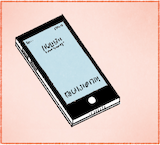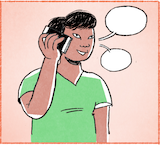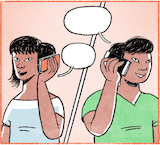



นี้คืออี่หยัง นี้คือโทละสับ
โทละสับเคี่ยงสี่เหลี่ยม เคี่ยงใหญ่หน่อยหนึ่ง บ่เคี่ยงใหญ่หลาย
มีหน้าจออันบักใหญ่หนึ่ง หน้าจอกะสีขาว หน้าจอกะเป็นสี่เหลี่ยม
โทละสับมีปุ่มกดพ้อม ปุ่มกดเป็นวงกมสีขาว เอาไว้ถ้ากด หลือเอาไว้ถ้าเฮ็ดอี่หยังกะบ่ลู้ เอาไว้ถ้าเฮ็ดหลายอย่าง
โทละสับใซ้จั่งใด เอาไว้เฮ็ดอี่หยัง โทละสับเอาไว้โทกะได้ เอาไว้เหล้นกะได้ เอาไว้เบิ่งหนังกะได้ เอาไว้ใซ้ได้หลายสิ่งหลายอย่าง เพาะว่าโทละสับมีปะโยดหลาย มีปะโยดบักคักหนึ่ง สามาดเฮ็ดได้หลายสิ่งหลายอย่าง
หลือเอาไว้โทกะได้ ขั้นเฮาอยู่ไกกัน หลืออยู่คนละปะเทด หลืออยู่คนละจังหวัด หลือสามาดโทหากันได้ โทเว้ากันได้
14
นี้คืออี่หยัง นี้คือโทละสับ
โทละสับมันเป็นหญัง โทละสับมันมีสายเข้า มีพุใดโทมากะบ่ลู้ ฮู้แต่ว่ามีคนโทเข้ามา
ขั้นญามมีคนโทมา มันสิเสียงดังบ่ กะเสียงดังอยู่ ขั้นคนโทมา มันสิเสียงดังขึ้น เสียงดังเลี้ยยๆ จนคนสิลับ มันจั่งสิเซาดัง
ขั้นเฮาอยากให้มันเซาดัง เฮาต้องเฮ็ดจั่งใด เฮากะกดลับ กดลับโทละสับ กดเว้ากับเขา หลือกดวางสายกะได้
ขั้นเฮากดวางสาย หลือกดลับแล้ว มันสิเซาเสียงดัง แล้วมันกะสิบ่เสียงดังอีกเลย
15
เขากำลังเฮ็ดหญัง เขากำลังเว้าโทละสับ
เขาเว้าโทละสับจั่งใด เขากำลังโทหาคนบางคน แล้วเขากะเว้ากัน เว้าทางโทละสับ
เขาเอาโทละสับวางไว้หู แล้วเขากะฟังเสียง หลือเว้าใส่โทละสับนั้น
แล้วคนที่อยู่ทางอื่น กะสิสามาดได้ญิน หลือเว้ากันได้ ทางโทละสับนี้
16
เขากำลังเฮ็ดหญัง เขากำลังเว้ากัน เขากำลังคุยโทละสับกัน สองคนนี้เขาโทหากัน
พุหญิงกับพุซาย เขาโทหากัน เขากำลังเว้ากันทางโทละสับ จักเขาเว้าอี่หยังกันกะบ่ลู้
สองคนนี้เขาอยู่ไกกันบ่ กะสิไกกันอยู่ กะสิอยู่ไกกันคัก เขากะเลยโทหากัน เขาอาดสิบ่ได้อยู่นำกัน เขากะเลยโทหากันกะได้
Link to overview page
Link to dictionary
| Isaan | Pronunciation | Tones | Thai | English/Notes |
|---|---|---|---|---|
| นี้ | ni: | HF | นี้ | 1. this 2. here |
| คือ | khʉ: | HR | คือ | 1. to be, to resemble, like, as 2. why {บักหล้าคือบ่เก็บโต่ะแน่ = [addressing a young boy] Why haven't you cleared the table?} |
| อี่หยัง | i:-yaŋ | H-M | อะไร | 1. what {นี้คืออี่หยัง = What is this?} {มื้อนี้เจ้าเฮ็ดอี่หยัง = What are you doing today?} {กินเข้างายกับอี่หยัง = What did you have for breakfast?} 2. something, anything, (in negations) nothing {บ่ต้องเฮ็ดอี่หยังอีกเลยนอกจากใส่ปุย = [we] don't need to do anything besides adding fertilizer} |
| โทละสับ | tho-la-sap | HR-H-M | โทรศัพท์ | phone Notes: pronunciation: also realized as โทระสับ |
| เคี่ยง | khi:aŋ | H | เครื่อง | 1. machine, engine 2. clf. for machines, airplanes, electronic devices etc. Notes: pronunciation: also realized as เคื่อง |
| สี่เหลี่ยม | si:-li:am | H-H | สี่เหลี่ยม | rectangle, square |
| ใหญ่ | ɲai | H | ใหญ่ | large, big |
| หน่อยหนึ่ง | nɔ:i-nʉŋ | H-H | นิดหน่อย | a bit, a little bit, not much Notes: see also หน่อยเดียว |
| บ่ | bɔ: | H | ไม่ | 1. no, not 2. question particle, transforming a statement into a question Notes: spelling exception in line with common usage on social media |
| หลาย | la:i | M | เยอะ, มาก | many, much, very |
| มี | mi: | HR | มี | 1. to have 2. there is |
| หน้าจอ | na:-jɔ: | LF-M | หน้าจอ | monitor, screen |
| อัน | an | M | อัน | 1. thing, object 2. general clf. for objects |
| บัก | bak | M | 1. intensifier before adjectives {ปาโตบักใหญ่ = a (very) large fish} 2. prefix in front of fruits and vegetables {บักแตงโม = watermelon} 3. can be used as a reference for a male person of the same or younger age {บักอันนี้ = this lad} |
|
| หนึ่ง | nʉŋ | H | หนึ่ง | 1. one 2. after adjective: intensifier {บักคักหนึ่ง = very much} {อันบักใหญ่หนึ่ง = very large}, or attenuates the meaning {กะดาดมันแผ่นน้อยๆ หนึ่ง = the piece of paper is [relatively] small} |
| กะ | ga | M | ก็ | 1. then, consequently 2. also |
| สี | si: | M | สี | 1. color 2. colored pencil, crayon |
| ขาว | kha:o | M | ขาว | white |
| เป็น | pen | M | เป็น | 1. to be, to exist 2. to be able to 3. to suffer, sth. happens to 4. เป็นหญัง[...]คือ in initial position: why? {เป็นหญังเขากะคือแปงฟัน = Why is he brushing his teeth?} {เป็นหญังเคี่ยงบินมันคือสิตก = Why is the airplane falling down?} |
| ปุ่ม | pum | H | ปุ่ม | button |
| กด | got | M | กด | 1. to push, to press (down) {กดปุ่ม = to push a button} 2. to withdraw [money] {กดเงิน = to withdraw money} |
| พ้อม | phɔ:m | HF | พร้อม | at the same time, also, too {มีตะเว็นพ้อม = the sun's out, too} {กะทะมีด้ามพ้อม = the pan has also a handle} |
| วงกม | woŋ-gom | HR-M | วงกลม | 1. circle, ring, sphere 2. round |
| เอา | ao | M | เอา | to take, to give {เขากำลังเอาก่องไปซั่ง = he's taking the boxes to weigh them} {หมอกำลังเอายาให้คนป่วยกิน = the doctor is giving medicine to the patient} {เอาไว้ถ้า = is for, is used for, has the purpose of} |
| ไว้ถ้า | wai-tha: | HF-LF | usually in a positive statement or answer: is for, is used for, has the purpose of {กะทะมีไว้ถ้าทอด = a pan is for frying} {น้ำบักนาวมีไว้ถ้าปุงอาหาน = lime juice is used to season food} {ปากกามีไว้ถ้าเขียน = a pen is for writing} {กะเทียมเอาไว้ถ้าเฮ็ดแนวกิน = garlic is used to make food} {ขาเอาไว้ถ้าญ่าง = legs are for walking} {เกิบเอาไว้ถ้าใส่ = shoes are for wearing} Notes: see also ไว้ |
|
| หลือ | lʉ: | M | หรือ | or |
| เฮ็ด | het | H | ทำ | to do, to make |
| ลู้ | lu: | HF | รู้ | 1. to know 2. to understand Notes: equivalent to ฮู้ |
| อย่าง | ya:ŋ | H | อย่าง | type, kind, sort, category |
| ใซ้ | sai | HF | ใช้ | to use |
| จั่งใด | jaŋ-dai | H-M | ยังไง, แบบไหน | how, in what manner {บักนาวมันมีลดซาดจั่งใด = Lime fruits have what kind of taste?} {เขาปิดแอจั่งใด = How is he switching off the A/C?} {เทียนใซ้จั่งใด = How's a candle used?} {สิใซ้จั่งใด = how is [it] used?} |
| ไว้ | wai | HF | ไว้ | 1. to keep, to put, to place, to retain, to save, to reserve {เขาเอาหัวของเขาไว้ใส = Where does she put her head?} {หมาสิเลี้ยงไว้บ้าน = dogs are kept/raised in the house} {ไก่เลี้ยงไว้ในคอก = chicken are kept/raised in a coop} {หน้ามันบังไว้ = the face is covered/not visible} {เขาเอาโทละสับวางไว้หู = he holds the phone to his ear} 2. for {นาลิกาปุกมีไว้เฮ็ดหญัง = What is an alarm clock for?} {หม้อเอาไว้เฮ็ดแนวกิน = a pot is used to make food} {ก่องเอาไว้เฮ็ดหญัง ก่องเอาไว้ใส่ของ = What is the box for? It's for putting in stuff.} Notes: see also ไว้ถ้า |
| โท | tho: | HR | โทร | phone: to call |
| ได้ | dai | HF | ได้ | 1. can 2. to get, to obtain 3. before verb: indicating past tense 4. บ่ได้ + verb: not |
| เหล้น | len | LF | เล่น | 1. to play, to enjoy oneself with, to do something for pleasure {เหล้นลูกบอน = to play ball} {เหล้นเกม = to play a game/games} {เหล้นน้ำ = to play with/in the water} {นั่งเหล้น = to sit} {กินเหล้น = to eat (as a snack), to snack} {เหล้นโน่ดบุ่ก = to use a laptop (for entertainment or work)} 2. to drop by, to spend time with, to come to visit {บ่ได้มาเฮ็ดหญัง มาเหล้นซื่อๆ = I've not come to do anything in particular, I'm just dropping by} |
| เบิ่ง | bəŋ | H | ดู | 1. to look at, to see, to watch {เบิ่งโทละทัด = to watch TV} {เบิ่งหนัง = to watch a movie} 2. to guess {เบิ่งซงแล้ว ... = [I] guess / from what it looks like ...} |
| หนัง | naŋ | M | หนัง | 1. skin 2. movie, film {เบิ่งหนัง = to watch a movie} |
| หลายสิ่งหลายอย่าง | la:i-siŋ-la:i-ya:ŋ | M-H-M-H | หลากหลาย, มากมาย, หลายอย่าง | varied, various, several (kinds etc.) |
| เพาะว่า | phɔ-wa: | H-H | เพราะว่า | because |
| ปะโยด | pa-yo:t | M-LF | ประโยชน์ | 1. benefit 2. useful |
| บักคักหนึ่ง | bak-khak-nʉŋ | M-H-H | intensifier: very, very much (variant of คัก) | |
| สามาด | sa:-ma:t | M-HF | สามารถ | can, to be able |
| ขั้น | khan | LF | เมื่อ | when, if |
| เฮา | hao | HR | เรา | 1. personal pronoun: we 2. personal pronoun: I |
| อยู่ | yu: | H | อยู่ | 1. to be (located) at 2. yet, still 3. auxiliary indicating continuous or progressive action {ทอดปาอยู่ในกะทะ = (in the process of) frying a fish in the pan} {แม่กำลังเมี้ยนเฮียนอยู่ = mother is cleaning/tidying up the house} |
| ไก | gai | M | ไกล | far, distant |
| กัน | gan | M | กัน | mutual, each other, with another, together {เขากำลังนั่งเว้ากัน = they're sitting and talking} {เขาสองคนฮักกัน = they love each other} {ปาสองโตนี้ ใหญ่ห่างกันหลายบ่ = These two fish here, are they very different in size (from each other)?} {ต่างกัน = to be different (from each other)} {ก่องอันไหนหนักกว่ากัน = Which box is heavier (than the other(s))?} |
| คนละ | khon-la | HR-H | คนละ | different, in a different manner {ไก่กับหมา เลี้ยงคนละแบบ = chicken and dogs are raised differently} {อยู่คนละปะเทด = [they] are in different countries} {คนละแบบ = different(ly), in a different manner} |
| ปะเทด | pa-thet | M-HF | ประเทศ | country {ปะเทดไทย = Thailand} |
| จังหวัด | jaŋ-wat | M-M | จังหวัด | province |
| หา | ha: | M | หา | to look for, to find |
| เว้า | wao | HF | พูด | to say, to speak, to talk |
| มัน | man | HR | มัน | it (also used to refer to people) |
| หญัง | ɲaŋ | M | อะไร, เป็นหญัง = ทำไม | 1. what {เขากำลังเฮ็ดหญัง = What is he doing?} {ธูปเอาไว้เฮ็ดหญัง = What are incense sticks for?} 2. something, anything, (nothing) 3. เป็นหญัง[...]คือ in initial position: why {เป็นหญังเขาคือใส่บักพิกลงไปในกวยเตียว = Why is he putting chili in [his] noodle soup?} {เป็นหญังหน้าต่างมันคือเปิด = Why is the window open?} {เป็นหญังมันคือมีควนไฟ = Why is there smoke?} |
| สาย | sa:i | M | สาย | 1. string, thread, wire, cord {หูฟังมีสาย = the headphones have a cord} {สายไฟ = power cord} 2. clf. for rivers, bus lines, phone calls {แม่น้ำสายนี้ข้ามบ่ได้ = you can't cross this river} {มีสายเข้า = there's an incoming call} |
| เข้า | khao | LF | เข้า | to enter, to go inside, to come/go in/on {เข้าห้องน้ำ = to go to the bathroom} {เข้านอน = to go to bed} {ขี่เลียเข้าไปเกาะ = to take a boat to go on an island} |
| พุใด | phu-dai | H-M | ใคร | 1. who {มีพุใดโทมากะบ่ลู้ = I don't know who has called} {ห้องนอนของพุใด = whose bedroom (is this)? } 2. someone, somebody, anybody, in negative context: nobody {บ่มีพุใดอยู่กับเขาเลย = there's nobody with him} |
| มา | ma: | HR | มา | 1. to come 2. auxiliary expressing action towards the present or focal time {กะคุเฮ็ดมาจากอี่หยัง = What is the bucket made of?} {แล้วเขากะเก็บเงินจากพุนั้นมา = and then she takes the money of that person} |
| ฮู้ | hu: | HF | รู้ | 1. to know 2. to understand Notes: equivalent to ลู้ |
| แต่ว่า | tɛ:-wa: | H-H | แต่ว่า | 1. but 2. only {ฮู้แต่ว่าเขายืนอยู่พุเดียว = I only know that he's standing there by himself} |
| คน | khon | HR | คน | person, people |
| ญาม | ɲa:m | HR | ยาม | 1. period of time {ญามมื้อเซ้า = morning} {ญามเที่ยง = noon} 2. when, while {ญามทอด ต้องใซ้น้ำมันพ้อม = one needs to use oil when frying} {ญามสิออกไปข้างนอกกะต้องใส่เกิบ = when one goes out, ones has to wear shoes} |
| สิ | si | M | จะ | future tense auxiliary {เขากำลังสิตื่น = he's about to wake up} {สิไปตะหลาด = [I'm] going to the market} |
| เสียงดัง | si:aŋ-daŋ | M-M | เสียงดัง | loud |
| ขึ้น | khʉn | LF | ขึ้น | 1. to go up, to increase 2. sun: to rise {ตะเว็นกำลังขึ้น = the sun is rising} 3. more 4. bus/train etc.: to get on, to board {พุโดยสานขึ้นลดไฟเบิดแล้ว = all passengers have boarded the train} |
| เลี้ยยๆ | li:ai | HF | เรื่อยๆ | continuously Notes: pronunciation: also realized as เลื้อยๆ |
| จน | jon | M | จน | 1. poor {คนจน = a poor person} 2. until, such that {เสียงดังเลี้ยยๆ จนคนสิลับ = (phone) it's ringing until [he/someone] answers the call} {ถ้าจน [...] = to wait until [...]} |
| ลับ | lap | H | รับ | 1. phone: to answer a call 2. to receive, accept, pick up, take up Notes: see also ฮับ |
| จั่ง | jaŋ | H | ค่อย (?) | then, afterwards {ต้องใซ้น้ำมันพ้อม มันจั่งสิทอดได้ = one needs to use oil as well, then one can fry [food]} |
| เซา | sao | HR | จบ | 1. to stop, to be finished {น้ำมันเซาไหลแล้ว = the water has stopped flowing} {ฝนเซาตกแล้ว = it has stopped raining} {มันสิเซาเสียงดัง = (phone) it stops ringing loudly} 2. to prevent, to hinder 3. to rest {เซาเมี่ยย = to rest} |
| ดัง | daŋ | M | ดัง | 1. noise/music etc.: loud 2. to make a noise, to ring, to go off etc. {นาลิกาปุกมันกะสิดังขึ้น = the alarm clock will go off} |
| อยาก | ya:k | LF | อยาก | to want, to wish |
| ให้ | hai | LF | ให้ | 1. to give {หมอกำลังเอายาให้คนป่วยกิน = the doctor is giving the patient medicine} 2. for 3. to allow, to be allowed |
| ต้อง | tɔŋ | HF | ต้อง | to have to, must |
| กับ | gap | M | กับ | 1. and {ลุงกับป้า = uncle and aunt} {กวยเตียวหมูกับกวยเตียวไก่ = noodle soup with pork and noodle soup with chicken} 2. with, to {ค้ายๆ กับคำว่า ... = similar to the word ...} 3. prefix in front of foods {กับเข้า = side dishes eaten with rice} {เขากินกับกวยเตียว = he's eating noodle soup} |
| เขา | khao | M | เขา | personal pronoun: he, she |
| วาง | wa:ŋ | HR | วาง | to place, to set/put down {โทละสับ/phone: วางสาย = to hang up} {มีเกิบวางอยู่ในก่อง = there are shoes in the box} {มือข้างหนึ่งเขาวางอยู่เทิงโต่ะ = he's put one of his hands on the table} |
| แล้ว | lɛ:o | HF | แล้ว | 1. finished 2. already 3. and then, and next (especially แล้วกะ) 4. auxiliary for past tense |
| อีก | i:k | LF | อีก | 1. more, again 2. other, another |
| เลย | lə:i | HR | เลย | 1. futher on, beyond, past {เข็มน้อยเลยเลขสิบสองไป = the minute hand has passed number twelve} 2. too much 3. at all 4. definitively 5. completely, utterly |
| กำลัง | gam-laŋ | M-HR | กำลัง | auxiliary indicating continuous or progressive action |
| บาง | ba:ŋ | M | บาง | 1. some {สัดบางโตบ่มีขา = some animals don't have legs} {บางคนสิมักกินกวยเตียวแทนเข้า = some people like to eat noodle soup instead of rice (dishes)} {บางสิ่งบางอย่าง = something, anything} 2. thin |
| ทาง | tha:ŋ | HR | ทาง | 1. way, direction {พุหญิงกะสิไปทางหนึ่ง พุซายกะสิไปอีกทางหนึ่ง = the woman goes one way, the man another way} {ตะเว็นไปทางใด = Where has the sun gone?} {เขาถีบจักกะย๊านไปทางหน้า = he's biking on/onward/forward} {มาเว้า มาว่าเฮาในทางที่บ่ดี = he's scolding [me], he's talking to me improperly} 2. by, through, via etc. {เว้าทางโทละสับ = to talk on the phone} |
| หู | hu: | M | หู | 1. ear 2. opening, hole, e.g., the hole a needle has to insert the thread 3. handle which has a hole, e.g., of a cup or pot |
| ฟัง | faŋ | HR | ฟัง | to listen, to hear |
| เสียง | si:aŋ | M | เสียง | 1. sound, noise 2. tone, voice |
| ใส่ | sai | H | ใส่ | 1. to put something in/on {เขาใส่บักพิกในกวยเตียวหลาย = he's putting a lot of chili in his noodle soup} {เขาบีบยาสีฟันใส่แปงสีฟัน = he squeezes toothpaste on the toothbrush} {ก่องเอาไว้ใส่ของ = boxes are there to put stuff in} 2. to wear (clothes) {เขาใส่เสี้ยแขนญาว = he's wearing a long-sleeve} 3. directed at {เอิ้นใส่กัน = to call each other/to say to each other} {หมามันเห่าใส่แมว = the dog barks at the cat} {ล้องเพงใส่ไม = to sing into the microphone} {เขากำลังซี้มือไปใส่พุซาย = she's pointing at the man} |
| นั้น | nan | HF | นั้น | that, there |
| ที่ | thi: | H | ที่ | 1. that, which {คนที่ยืนอยู่ฝั่งขวา = the person which is standing on the right = the person standing on the right} {เว้าคำที่บ่สุพาบ = to speak words which are impolite = to speak impolitely} 2. for ordinal numbers {ที่สาม = third} |
| อื่น | ʉ:n | H | อื่น | other |
| ได้ญิน | dai-ɲin | HF-HR | ได้ยิน | to hear |
| คุย | khui | HR | คุย | to talk, to chat, to have a conversation |
| สอง | sɔ:ŋ | M | สอง | two |
| พุหญิง | phu-ɲiŋ | H-M | ผู้หญิง | woman, female |
| พุซาย | phu-sa:i | H-HR | ผู้ชาย | man, male |
| จัก | jak | M | จัก | 1. answer to a question: [I] don't know, don't know exactly, [I'm] not sure {พุซายคนนี้เขาเถ้าไป่ จัก จักเถ้าหลือบ่เถ้า เบิ่งบ่ค่อยออก = Is this man here already old? I don't know. I can't see clearly whether he's old or not.} {เขาเว้ากันอยู่ใส จักคือกัน = Where are they talking? I don't know either.} 2. exact(ly), what exactly {จักต้มอี่หยังกะบ่ฮู้ = I don't know what (exactly) he is cooking} {บ่ลู้คือกันจักปาอี่หยัง = I don't know either what kind of fish this is} 3. how much/many? {ต้นไม้มีจักต้น = How many trees are there?} {ตอนนี้จักโมงแล้ว = What time is it now?} {มือของเฮานี้สิมีจักนิ้ว = How many fingers do our hands have?} 4. a bit, a little bit {จักหน่อย/จักหน่อยหนึ่ง = a bit, a little bit} |
| คัก | khak | H | intensifier: very, very much | |
| อาด | a:t | LF | อาจ | 1. might, may, will 2. likely |
| นำกัน | nam-gan | HR-M | together, jointly, with one another {บ่สามาดใซ้นำกันได้ = can't be used together} {เขากำลังญ่างนำกัน = they are walking together} {เหล้นบ่าดนำกันบ่ = Shall we play basketball?} |